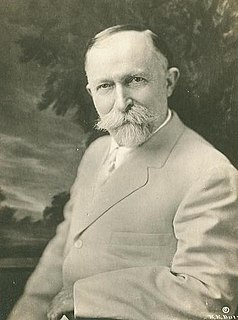Top 169 Aggregate Quotes & Sayings - Page 3
Explore popular Aggregate quotes.
Last updated on December 21, 2024.
While Congress did not, to my knowledge, calculate aggregate dollar values for the nationwide effects of racial discrimination in 1964, in 1994 it did rely on evidence of the harms caused by domestic violence and sexual assault, citing annual costs of $3 billion in 1990 and $5 to $10 billion in 1993.
The quotes are often poignant or funny (one man before the firing squad requests a bulletproof vest) and often don't register as much more than interesting historical documents from centuries past. But read in aggregate, all that pain piles up. Essentially, Elder has amassed a collection of what people say when they know they are going to die, the final product of what could be seen as psychological torture.
A small group is powerful in matters relating to a particular industry, because then it is normally the only organized force, but it is less formidable when questions which divide the entire nation are involved, for then it must take on organized labor and other large organized groups. The business community in the aggregate is for this reason not uniquely effective as a pressure group.
My view is that homosexual acts, not homosexuality, but homosexual acts are wrong. They’re intrinsically wrong. And I think in a natural law based country it’s appropriate to have policies that reflect that They don’t comport with natural law. I happen to think that it represents (to put it politely; I need my thesaurus to be polite) behavior that is not healthy to an individual and in aggregate is not healthy to society.
Broadly speaking, Keynesianism means that the government has a specific responsibility for the behavior of the economy, that it doesn't work on its own autonomous course, but the government, when there's a recession, compensates by employment, by expansion of purchasing power, and in boom times corrects by being a restraining force. But it controls the great flow of demand into the economy, what since Keynesian times has been the flow of aggregate demand. That was the basic idea of Keynes so far as one can put it in a couple of sentences.
It should be possible to emphasize to students that the level of employment is a macroeconomic issue, depending in the short run on aggregate demand and depending in the long run on the natural rate of unemployment, with microeconomic policies like tariffs having little net effect. Trade policy should be debated in terms of its impact on efficiency, not in terms of phoney numbers about jobs created or lost.
Just look at that Forbes 400. Takes a billion three to get on the Forbes 400 this year. And the aggregate wealth is just staggering. And those people are paying less percentage of their total income to the federal government than their receptionists are. [...] I'll bet a million dollars against any member of the Forbes 400 who challenges - me that the average for the Forbes 400 will be less than the average of their receptionists.
Unlike earlier thinkers, who had sought to improve their accuracy by getting rid of error, Laplace realized that you should try to get more error: aggregate enough flawed data, and you get a glimpse of the truth. "The genius of statistics, as Laplace defined it, was that it did not ignore errors; it quantified them," the writer Louis Menand observed. "...The right answer is, in a sense, a function of the mistakes.
Among other grand achievements, F. A. Hayek had a remarkable career pointing out the flaws in collectivism. One of his keenest insights was that, paradoxically, any collectivist system necessarily depends on one individual (or small group) to make key social and economic decisions. In contrast, a system based on individualism takes advantage of the aggregate, or 'collective,' information of the whole society; through his actions each participant contributes his own particular, if incomplete, knowledge-information that could never be tapped by the individual at the head of a collectivist state.
Finding meaning in global mass phenomena can be difficult because the phenomena themselves are invisible, spread across the earth in millions of separate places. There is no Mount Everest of waste that we can make a pilgrimage to and behold the sobering aggregate of our discarded stuff, seeing and feeling it viscerally with our senses.
The time to hurry is in between shots. It's not over the shot. It's timing how people walk. You have to add that to the equation. If you've got somebody walking slow and they get up to the shot and take their 20 seconds, what's the aggregate time for them to hit that shot in between shots? That's what really matters. It's not the shot at hand.
Legal plunder can be committed in an infinite number of ways; hence, there are an infinite number of plans for organizing it: tariffs, protection, bonuses, subsidies, incentives, the progressive income tax, free education, the right to employment, the right to profit, the right to wages, the right to relief, the right to the tools of production, interest free credit, etc., etc. And it the aggregate of all these plans, in respect to what they have in common, legal plunder, that goes under the name of socialism.
People at the top spend less money than those at the bottom so when you have redistribution toward the top, aggregate demand goes down. Unless you intervene, you're going to have a weak economy unless something else happens. That something else could be a bubble. The United States tried a tech bubble and a housing bubble, but those were not sustainable answers. So I view inequality as a fundamental part of our macroeconomic weakness.
There is no such thing as agflation. Rising commodity prices, or increases in any prices, do not cause inflation. Inflation is what causes prices to rise. Of course, in market economies, prices for individual goods and services rise and fall based on changes in supply and demand, but it is only through inflation that prices rise in aggregate.
'The anthropocene' refers to the way we live now, in a highly globalized world, characterized by a large human population and powerful technologies that allow for "action at a distance" that aggregate apparently negligible acts into powerful forces that are transforming fundamental planetary systems. In this sense 'the anthropocene' refers to a period in which nature as an independent autonomous domain comes to an end or is under serious threat.
I do not mean to impugn the social justice and social expediency of the redistribution of incomes aimed at by N.I.R.A. and by the various schemes for agricultural restriction. The latter, in particular, I should strongly support in principle. But too much emphasis on the remedial value of a higher price-level as an object in itself may lead to serious misapprehension as to the part which prices can play in the technique of recovery. The stimulation of output by increasing aggregate purchasing power is the right way to get prices up; and not the other way round.
If the world is an aggregate of relatively independent regions, then any assumption of universal laws is false and a demand for universal norms tyrannical: only brute force (or seductive deception) can then bend the different moralities so that they fit the prescriptions of a single ethical system. And indeed, the idea of universal laws of nature and society arose in connection with a life-and-death battle: the battle that gave Zeus the power over the Titans and all other gods and thus turned his laws into the laws of the universe.
The latest research on social mobility showed that there's a large aggregate decline in the U.S. in your chances of earning more than your parents. But I think where the story becomes more optimistic one is that there are pockets of America, where children from low-income families have significant chances of rising up in the income distribution. This finding of big geographic variation is an encouraging one because it shows that there are places where we see the American Dream thriving and we simply need to understand how can we replicate those successes elsewhere throughout the country.
I think that one of the things that we all agree to is that the touchstone for economic policy is, does it allow the average American to find good employment and see their incomes rise; that we can't just look at things in the aggregate, we do want to grow the pie, but we want to make sure that prosperity is spread across the spectrum of regions and occupations and genders and races; and that economic policy should focus on growing the pie, but it also has to make sure that everybody has got opportunity in that system.
Now it is worth noticing two things about the private substitutes that I have described. The first is that in the aggregate they are probably much more expensive than would be the implementation of the appropriate public policy. The second is that they are extremely poor replacements for the missing outcomes of good public policy. Nevertheless, it is plain that the members of a society can become so alienated from one another, so mistrustful of any form of collective action, that they prefer to go it alone.
The ancient intuition that all matter, all "reality," is energy, that all phenomena, including time and space, are mere crystallizations of mind, is an idea with which few physicists have quarreled since the theory of relativity first called into question the separate identities of energy and matter. Today most scientists would agree with the ancient Hindus that nothing exists or is destroyed, things merely change shape or form; that matter is insubstantial in origin, a temporary aggregate of he pervasive energy that animates the electron.
While the individual man is an insoluble puzzle, in the aggregate he becomes a mathematical certainty. You can, for example, never foretell what any one man will be up to, but you can say with precision what an average number will be up to. Individuals vary, but percentages remain constant. So says the statistician.
There's no automatic mechanism in a market system that reconciles the desire to save and the desire to invest. And therefore, the government has to sort of do something or the Federal Reserve, the Fed, or the Central Bank, or whatever, it has to intervene. It has to create enough investment for the economy not to suffer from a fall in aggregate demand. So, if you don't have a balance within the market system itself, then you need an external balance and that's what I think Keynes believed.
Men have cried out to me in sincere and despairing appeal: 'Doctor, I cannot go on like this! I have everything to live for! I must stop, but I cannot! You must help me!'...One feels that something more than human power is needed to produce the essential psychic change. Though the aggregate of recoveries resulting from psychiatric effort is considerable, we physicians must admit we have made little impression upon the problem as a whole. Many types do not respond to the ordinary psychological approach.
We think of religion as the symbolic expression of our highest moral ideals; we think of magic as a crude aggregate of superstitions. Religious belief seems to become mere superstitious credulity if we admit any relationship with magic. On the other hand our anthropological and ethnographical material makes it extremely difficult to separate the two fields.
It's been a prevalent notion. Fallen sparks. Fragments of vessels broken at the Creation. And someday, somehow, before the end, a gathering back to home. A messenger from the Kingdom, arriving at the last moment. But I tell you there is no such message, no such home -- only the millions of last moments . . . nothing more. Our history is an aggregate of last moments.
The basic aggregate measure of gearing or leverage is telling us that today's advanced economies' operating systems are more heavily dependent on private sector credit than anything we have ever seen before. Furthermore, this pattern is seen across all the advanced economies, and isn't just a feature of some special subset (e.g. the Anglo-Saxons).
Perfect love is to feeling what perfect white is to color. Many think that white is the absence of color. It is not. It is the inclusion of all color. White is every other color that exists, combined. So, too, is love not the absence of an emotion (hatred, anger, lust, jealousy, covetousness), but the summation of all feeling. It is the sum total. The aggregate amount. The everything.
The possibility that stock value in aggregate can become irrationally high is contrary to the hard-form "efficient market" theory that many of you once learned as gospel from your mistaken professors of yore. Your mistaken professors were too much influenced by "rational man" models of human behavior from economics and too little by "foolish man" models from psychology and real-world experience.
What's so bad about Google knowing I need Kleenex? Look at it in the aggregate - see how information... can be used to target people based on their profiles and change the course of human history, as I believe it is already beginning to do. This knowledge that I need Kleenex has bigger complications than just needing Kleenex.
While it might be true that our reality would suggest that more writers would address these elemental issues of modern life - work, the marketplace, brutality, race - I'm not sure I have enough of a sense in aggregate of what the dominant novelists are doing to comment on why less do, or if less do. Maybe that's partly because I don't feel woven into any kind of fabric of contemporaries; I just read what I read, and do what I do.
Having always imagined myself in a fairly slim minority, I suddenly saw that I was in a vast company. Difference unites us. While each of these experiences can isolate those who are affected, together they compose an aggregate of millions whose struggles connect them profoundly. The exceptional is ubiquitous; to be entirely typical is the rare and lonely state.
One of my favorite literary theorists, Mikhail Bakhtin, wrote that the defining characteristic of the novel is its unprecedented level of "heteroglossia" - the way it brings together so many different registers of language. He doesn't mean national languages, but rather the sublanguages we all navigate between every day: high language, low language, everything. I think there's something really powerful about the idea of the novel as a space that can bring all these languages together - not just aggregate them, like the Internet is so good at doing, but bring them into a dialogue.
The basic prescription for preventing deflation is therefore straightforward, at least in principle: Use monetary and fiscal policy as needed to support aggregate spending, in a manner as nearly consistent as possible with full utilization of economic resources and low and stable inflation. In other words, the best way to get out of trouble is not to get into it in the first place.
You never can tell, though, with suicide notes, can you? In the planetary aggregate of all life, there are many more suicide notes than there are suicides. They're like poems in that respect, suicide notes: nearly everyone tries their hand at them some time, with or without the talent. We all write them in our heads. Usually the note is the thing. You complete it, and then resume your time travel. It is the note and not the life that is cancelled out. Or the other way round. Or death. You never can tell, though, can you, with suicide notes.
Perhaps no man is an island, but every man and woman is a nation unto herself. I actually had to look up the definition of "nation"; this is how awkward my relation is to this concept. And it is defined as, "a large aggregate of people united by common descent, history, culture, or language, inhabiting a particular country or territory." Perhaps if you replace "descent" with "dissent" the definition becomes more meaningful.
It is an unfortunate fact that great and foolish excess can come into prices of common stocks in the aggregate. They are valued partly like bonds, based on roughly rational projections of use value in producing future cash. But they are also valued partly like Rembrandt paintings, purchased mostly because their prices have gone up, so far.
It is not the ownership of the instruments of production which it is important for the State to assume. If the State is able to determine the aggregate amount of resources devoted to augmenting the instruments and the basic rate of reward to those who own them, it will have accomplished all that is necessary. Moreover, the necessary measures of socialization can be introduced gradually and without a break in the general traditions of society.
Anyway, the US, as in most issues, is the best, has the best capability to lead, and really needs to lead. It doesn't [mean] that other countries won't pick different tacks and emphasize different things. In aggregate, they're almost half of the energy R&D. Europe, China, Japan - it's very important that they come along and contribute to these things.
I think what we need is better understanding of how to do risk analysis of a CDO, but that they still can perform a very valuable function because they can aggregate these risks and pass them around so that mortgages or other kinds of loans can be packaged and sold to investors all over the world, who in most times, would justify a small amount of each one.
I still believe that, in the long run, the aggregate of the decisions of individual businessmen, exercising individual judgment in a free economy, even if often mistaken, is likely to do less harm than the centralized decisions of a Government; and certainly the harm is likely to be counteracted faster. As I said earlier in this debate, our economic medicine may be painful but it is fast and powerful because it can act freely.
Is the purpose of free elections to allow the most clever and vicious person to aggregate power, or is the purpose of free elections to enable the American people to have a serious conversation about their country's future and try to find both a policy and a personality that they think will carry to them that better future?
Then came the gadgeteer, otherwise known as the sporting-goods dealer. He has draped the American outdoorsman with an infinity of contraptions, all offered as aids to self-reliance, hardihood, woodcraft, or marksmanship, but too often functioning as substitutes for them. Gadgets fill the pockets, they dangle from neck and belt. The overflow fills the auto-trunk and also the trailer. Each item of outdoor equipment grows lighter and often better, but the aggregate poundage becomes tonnage.
My share of the work of the world may be limited, but the fact that it is work makes it precious. Darwin could work only half an hour at a time; but in many diligent half-hours he laid anew the foundations of philosophy. Green, the historian, tells us that the world is moved not only by the mighty shoves of the heroes, but also by the aggregate of the tiny pushes of each honest worker.
If religions are diseases of the human psyche, as the philosopher Grintholde asserts, then religious wars must be reckoned the resultant sores and cankers infecting the aggregate corpus of the human race. Of all wars, these are the most detestable, since they are waged for no tangible gain, but only to impose a set of arbitrary credos upon another's mind.
I said to myself & to my coleagues at Melwood that I'd probably never play for a better club with a better players than Liverpool ever again, Then I went to Real Madrid & in 2009 we met Liverpool in the CL first knock-out round. Liverpool beat us 5-0 on aggregate. I wasn't happy because my team had lost but I was happy with my promise. I did NOT play for a better club with a better players than LIVERPOOL














































